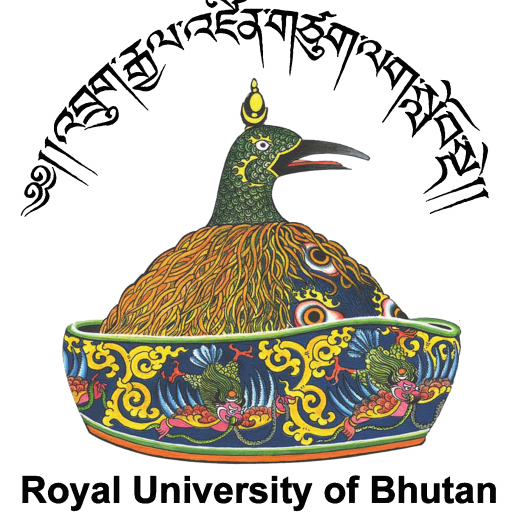| RUB COVID-19 | Task Force on Learning & Teaching |
Background
- Starting 19 March 2020, all forms of campus-based teaching and learning was discontinued on all constituent and affiliate colleges of the Royal University of Bhutan (RUB). Subsequently, most of the students are sent home and face-to-face classroom or lab-based teaching and learning are suspended indefinitely. This is in response to the government’s directive to close all educational institutions across the Kingdom and in the wake of spread of COVID-19 globally.
- The normal operations of the University continue on college campuses and at the Office of the Vice Chancellor (OVC). Academic staff on college campuses continue their teaching through Moodle and others tools – Internet and social media.
- Although RUB has been using Moodle for the last ten years, the abrupt transition to full online learning and teaching for all modules is not smooth sailing for both lecturers and learners. Our programmes are predominantly fulltime and the delivery of modules are designed for classroom based face-to-face teaching and learner engagement.
- Although caught unaware and unprepared, RUB is facilitating the full online learning of 1069 modules facilitated by lecturers for the current Spring semester 2020.
- The second meeting (through video conferencing) of the executives of RUB on 9 April 2020 (Meeting of RUB COVID-19 Response Plan) decided to form a task force to address the challenges of online teaching and learning and the disruption to continuity of teaching due to the contagion.
- Minutes of the 9 April meeting of executives outlines the general engagement of the task force. This paper defines the remit of the task force with specific tasks and expected outcomes amongst others.
General Objective and Title
- RUB is creating a dedicated working group to advise the University on its operations related to learning and teaching amidst the disruptions of normal functioning of colleges and uncertainties of way forward due to COVID-19. The task force is expected to help RUB navigate through this uncertain period by studying and identifying disruptions and challenges in learning and teaching, and by planning and recommending mitigating responses to the University.
- The title of the task force is RUB COVID-19 Task Force on Learning and Teaching.
Remit
- Under the authority of the Vice Chancellor, the RUB COVID-19 Task Force on Learning and Teaching is charged with the following:
Immediate Thrusts
- Studying the situation of learning and teaching of all modules for Spring Semester 2020 to analyse and recommending
- the continuity of current online mode of delivery as executed by respective colleges or with more appropriate changes. The changes to be considered could be informed by the achievement of learning outcomes of every module and the progress of students assessment of their learning on every module.
- the discontinuation of the current online learning and teaching and suitable mitigations through ‘make up’ teaching once the colleges open by extending daily teaching hours and semester duration into the summer vacation period. This would be feasible if the contagion eases and colleges open their campuses to students within the next few weeks.
- the postponement of Spring semester 2020 to the next semester if the college closure extends by a month. This action will have a domino effect on successive semester unless sacrifice are made to summer and winter ‘breaks’.
- criteria and procedures, event-driven, for altering academic regulations in response to COVID-19’s disruptions to University learning and teaching.
- Actions of compliance with guidance issued by the government (RGoB) and the Ministry of Health (MoH) with regards to our learning and teaching activities (engagement of students and actions of lecturers).
Future Thrusts - Preparing for contingencies, including procedures, policies, and communications related to learning and teaching in the event Bhutan’s COVID-19 scenario moves to RED ZONE.
- Developing plans for a resumption of normal operations, when circumstances allow
Membership and Terms of Operation
- Lead by the Director (Academic Affairs) as the chair, the task force will comprise of all Deans of Academic Affairs (ex officio). Currently they are:
- Dr Sonam Rinchen, SCE
- Dr Tshewang Lhendup, CST
- Samten Lhendup, JNEC
- Dr Tenzin Wangchuk, Sherubtse College
- Tshering Thinley, YCC
- Tshering, GCIT
- Pema Wangchuk, CLCS
- Dr Tulsi Gurung, CNR
- Dr Shivaraj Bhattarai, RTC
- Dr Lungten Wangdi, PCE
- Karma Dukpa, NRC and
- Jamyang Tenzin, GCBS
- Dr Sonam Tobgay, Chief (PTL) at the Academic Affairs, OVC will be the Secretary to the task force. He will coordinate the activities and logistics of the group in consultation with the Chair of the task force.
- In observation of social distancing and to save time and resources spent on travelling, the task force will work predominantly online (discussions through shared folders on Google Drive, chats on WhatsApp, video conferencing, etc.) and only meet face-to-face where and when absolutely necessary.
- If and when funds are required for the operation of the task force, separate approvals will be sought through the established norms at the OVC. Where projected expenditure is not too substantial, fund may be sourced from Academic Affair’s Programme Development & Initiatives line of budgeting.
- The task force will begin its work upon approval of this paper by the Vice Chancellor and its work will continue until the Vice Chancellor dissolves the task force.
- The outcomes of the task force, in the form of periodic reports, will be submitted to the Vice Chancellor as recommendations. The University, based on the authority and lines of accountability of entities, will act upon the recommendations within five days to take appropriate actions. Such decisions will be intimated to the task force (through the Secretary) for subsequent follow up and continuity of the task force’s work.
